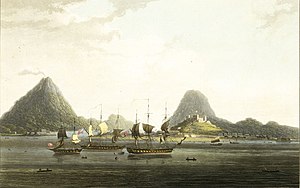| Invasion of the Spice Islands | |||||||||
|---|---|---|---|---|---|---|---|---|---|
| Part of the Napoleonic Wars | |||||||||
 View of the Island of Banda Neira – captured by a force landed from a squadron under the Command of Captain Cole in the morning of 9 August 1810 | |||||||||
| |||||||||
| Belligerents | |||||||||
|
| |||||||||
| Commanders and leaders | |||||||||
|
Christopher Cole Edward Tucker |
Herman Willem Daendels R. Coop à Groen | ||||||||
| Strength | |||||||||
|
7 ships 1,000 soldiers and Marines | various forts and coastal defences | ||||||||
| Casualties and losses | |||||||||
| light | all islands, fortifications and military stores captured[1] | ||||||||
The invasion of the Spice Islands was a military invasion by British forces that took place between February and August 1810 on and around the Dutch owned Maluku Islands (or Moluccas) also known as the Spice Islands in the Dutch East Indies during the Napoleonic wars.
By 1810 the Kingdom of Holland was a vassal of Napoleonic France and Great Britain along with the East India Company sought to control the rich Dutch spice islands in the East Indies. Two British forces were allocated; one to the island of Ambon and Ternate, then another force would capture the more heavily defended islands of Banda Neira, following which any other island that was defended.
In a campaign that lasted seven months British forces took all of the islands in the region; Ambon was captured in February, Banda Neira in August and Ternate and all other islands in the region later that same month.[2]
The British held on to the islands until the end of the war. After the Anglo-Dutch Treaty of 1814 the islands were handed back to the Dutch, but in the meantime the East India Company had uprooted a lot of the spice trees for transplantation throughout the British Empire.[3]
- ^ Woodman pp. 104–06
- ^ "Sir Christopher Cole, K.C.B.". The Annual biography and obituary. Vol. 21. London: Longman, Hurst, Rees, Orme, and Brown. 1837. pp. 114–123. Retrieved 22 December 2011.
- ^ Milne, Peter (16 January 2011). "Banda, the nutmeg treasure islands". Jakarta Post. Jakarta. pp. 10–11. Retrieved 22 December 2011.
But the economic importance of the Bandas was only fleeting. With the Napoleonic wars raging across Europe, the British returned to the Bandas in the early 19th century, temporarily taking over control from the Dutch. The English uprooted hundreds of valuable nutmeg seedlings and transport them to their own colonies in Ceylon and Singapore, breaking forever the Dutch monopoly and consigning the Bandas to economic decline and irrelevance.
© MMXXIII Rich X Search. We shall prevail. All rights reserved. Rich X Search
